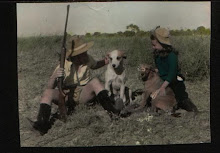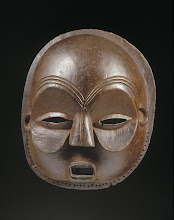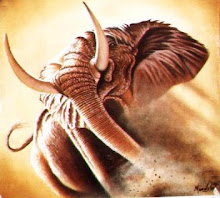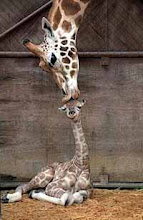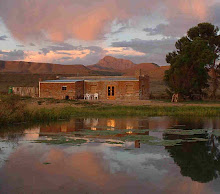
By the time I started to go into the valley, the Chartered Exploration Company had lost interest in the descent, and was using other roads into the Zambezi valley. This track was used mainly by fishermen taking their bundles of dried fish to the market.
My next run into Chief Chiawa's area was with the use of two donkeys that I had borrowed from a next door neighbor who lent them with the proviso that a substantial amount of meat was to be paid in lieu of their use. Together with my hunting companion, Edward, and the neighbor's son we stood at the top of the descent and gazed into the valley. All our goods were tied onto the two donkeys, and we walked free and easily along the track. Now we had to descend into the valley, and we stood contemplating the view. The rainy season had not done too much damage to the road down the mountain side, and we started down with my two companions leading the donkeys and myself bringing up the rear. Edward carried the Mauser rifle, and I the small .22 saloon. Down we went. The track was so steep that we had to brake all the way down, and by the time I hit the valley floor my calf muscles felt as if they were going to tear away from the bone.
After a short rest, we took off for our campsite next to a water pan, only to find when we arrived that a herd of elephant had been there and had turned the normally clear water into a sea of mud. It was well into the dry season, and we knew of no other water close by, all the streams running towards the Zambezi River were only dry gulches, and we would either have to stay there and wait for the spring in the pan to clear itself, or trek on to the river itself, a distance of about forty miles. I had loaded a two gallon jerry can with fresh water from our borehole as drinking water, so we decided to stay and let the mud settle, and forget about washing till it had cleared. We moved to our old campsite and set about enlarging the thorn boma to accommodate the two donkeys in order to secure them from the many predators in the area. The neighbor's son was delegated to watch them during the day so that they could graze and not fall prey to the many lions in the valley. Our first task was to collect enough firewood to last us through the long weekend of our stay in the valley. We brought in a number of large hardwood logs which we could not have done if we did not have the donkeys to haul them into camp.
Our first task was to collect enough firewood to last us through the long weekend of our stay in the valley. We brought in a number of large hardwood logs which we could not have done if we did not have the donkeys to haul them into camp.
Thus settled, Edward and I started to hunt towards the Zambezi River. The donkeys were left in the charge of the neighbor's son, and we took to the bush. At about mid morning we came across a small herd of kudu. There was a beautiful bull with long spiraling horns, a dark grey coat with white stripes down the sides of his ribs. He must have sensed our presence, as he looked straight at us. I could see the vee stripe in the most brilliant white across his muzzle, and the delicate fringe of long hair down his throat. The wind was blowing from them to us, and it was not possible for them to get our scent, but the bull snorted, and the herd galloped off with their white powder puff tails bidding us a fond farewell.
Ahead was a dry gulch, and we walked towards it to cross. As we neared it we heard something snuffling in the bed of the gulch, and creeping slowly forward we saw a small family of warthogs on their knees with their snouts churning up the bed searching for succulent grass roots I stood up, and the old boar saw me; up went his tail and off the family ran down the gulch as if the devils were behind them. We crossed the gulch, and entered a plain with broken mopani trees sparsely dotted over the veldt. The elephants had been busy, and dried logs lay in a jumble all over the place. Where the trees had been broken off, new shoots had grown, and these were already about ten feet tall. We walked into the mopani bushes, and of course we could not see more than ten paces ahead of us.
The morning was turning very warm, and both of us felt like a rest. Near us was a very large termite mound with an untouched Mopani tree growing out of its centre, and which provided appealing shade. We decided to climb to the top, and take a ten minute break in the shade and at the same time look over the mopani scrub to see how far it extended. After settling down and taking a swallow of cool water I stood up and surveyed the tops of the scrub bushes. Suddenly, not more than ten paces from where we sat, I saw the mopani saplings shake violently. Then as I gazed in that direction the tip of an elephant's trunk emerged above the green leaves. While I stared at it, another, and then another one emerged, and soon we were surrounded by trunk tips sensing the air. We had walked right into a herd of sleeping elephant, and even though we were talking to each other, they had not sensed our presence as the air was very still in the glade. But now that we were on top of the termite mound the air had probably shifted, and our scent became evident to them, and they were testing the wind to see where that hated stink was coming from. Suddenly one let out a shrill trumpet, and the whole family group crashed past us in a panic. One passed our perch on the mound so closely that I could see its eye lashes. Had we been on the floor and not on the mound, we would have been in big trouble. We sat tight for at least an hour before we ventured down the mound, and then took off in the direction opposite to which they had gone, and then circled back towards the river. After a slog of about two hours we emerged from the erratic bush into an open vlei at the centre of which was a dried up water hole. At the edge of the hole we could see a carcass lying, and we walked over to investigate. I was an old bull elephant, and he had been dead for at least three weeks there was still some skin over the bones, but the flesh had gone, eaten by predators and finished off by vultures. The hide left over was streaked with their droppings, and the whole thing smelt of death. The elephant was lying on its side, and I could see a magnificent tusk protruding into the air. I walked closer, and there was another one half covered by sand.
After a slog of about two hours we emerged from the erratic bush into an open vlei at the centre of which was a dried up water hole. At the edge of the hole we could see a carcass lying, and we walked over to investigate. I was an old bull elephant, and he had been dead for at least three weeks there was still some skin over the bones, but the flesh had gone, eaten by predators and finished off by vultures. The hide left over was streaked with their droppings, and the whole thing smelt of death. The elephant was lying on its side, and I could see a magnificent tusk protruding into the air. I walked closer, and there was another one half covered by sand.
Tugging on the free tusk, it came loose, and after a few tugs out it came. It was a beauty; better than seventy pounds in weight. We pulled out the other one which was even heavier and perfectly formed. It took both our efforts to carry the tusks into the bush and stash them under a tall tree, and then we set off for the camp to fetch the donkeys.
On our return we cut some string bark off a brakestegia tree, and wound it into a rope to hang the tusks over the back of the largest donkey, and then we headed back to camp. As we entered the mopani forest we came across a large herd of Impala antelope, and using the .22 I dropped two nice rams. These we slung onto the other donkey, and within an hour we arrived at the camp. We stowed the two tusks under some fresh leaves in case we should have unwelcome visitors, and then skinned the two impala. That night we made a pot of stiff maize porridge, and grilled the hearts and livers of the Impalas. Sitting and eating, the talk turned to the discovery of the dead elephant. He had obviously not been shot by poachers, and his demise could only be laid before a rival bull. Then the talk centered on the legend of an elephant graveyard.

I had often heard of such a place while sitting in the company of hunters, but although they all believed that a place existed where the elephants went when they felt death to be upon them, no one had ever come across such a place, and their belief in it was reinforced as not many carcasses were ever found in the bush. But here we had found one, and speculation ran high.
Very few bones are ever found lying around, and if the elephants fell as they died, and as they were such large beasts, it seemed that more carcasses should be lying around. Edward had grown up in the close proximity to these animals, and he too had never found their bones in the bush this carcass was a first for him too. The subject fascinated me, and I resolved to find out more about the matter. Early the next morning we packed up camp, and headed back up the mountain and soon we were out of the valley and while in the foothills a small herd of sable antelope ran across our path, and a young bull fell to a shot behind the shoulder. We had enough meat, and we set off for home at a steady pace.
Back in Lusaka I found a Greek who bought the tusks from me one hundred pounds each, and I had enough money to buy a second hand Land Rover. Now I could go into the valley and cover a lot more ground than we could on foot, and more meat could be brought out and we could turn a tidy profit. While in the city, I scoured the library for information on the elephants' burial ground, but although a lot was said about it, no one had ever found such a place, and the consensus was that there was a fortune just waiting to be found.
I did find a short poem by Cullen Gouldsbury which has stayed with me all these years, and which I would like to share with you:
Pile upon pile of bleaching bone, and a foul miasmic breath.
With now and again a mighty moan, to break the hush of death.
Sluggish streams and silver beams of a silent moon on high.
God forefend, I should meet my end in the place where the elephants die.
Cullen Gouldsbury.

